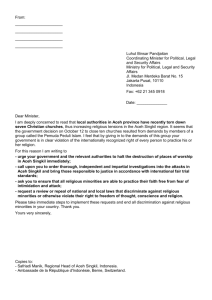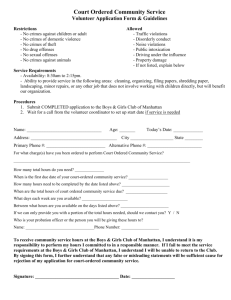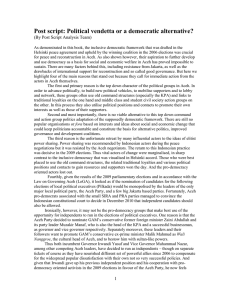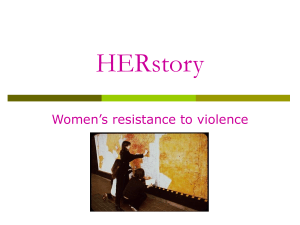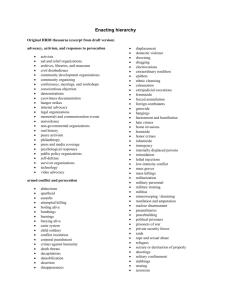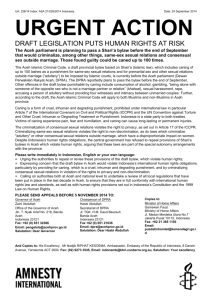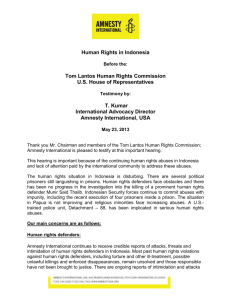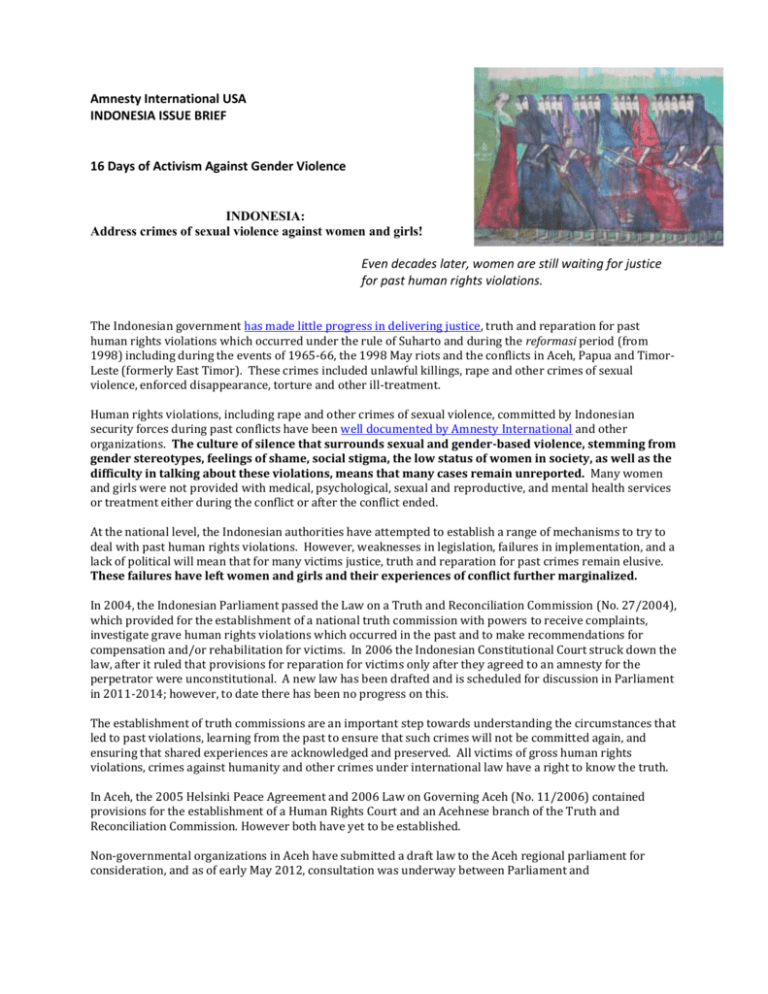
Amnesty International USA
INDONESIA ISSUE BRIEF
16 Days of Activism Against Gender Violence
INDONESIA:
Address crimes of sexual violence against women and girls!
Even decades later, women are still waiting for justice
for past human rights violations.
The Indonesian government has made little progress in delivering justice, truth and reparation for past
human rights violations which occurred under the rule of Suharto and during the reformasi period (from
1998) including during the events of 1965-66, the 1998 May riots and the conflicts in Aceh, Papua and TimorLeste (formerly East Timor). These crimes included unlawful killings, rape and other crimes of sexual
violence, enforced disappearance, torture and other ill-treatment.
Human rights violations, including rape and other crimes of sexual violence, committed by Indonesian
security forces during past conflicts have been well documented by Amnesty International and other
organizations. The culture of silence that surrounds sexual and gender-based violence, stemming from
gender stereotypes, feelings of shame, social stigma, the low status of women in society, as well as the
difficulty in talking about these violations, means that many cases remain unreported. Many women
and girls were not provided with medical, psychological, sexual and reproductive, and mental health services
or treatment either during the conflict or after the conflict ended.
At the national level, the Indonesian authorities have attempted to establish a range of mechanisms to try to
deal with past human rights violations. However, weaknesses in legislation, failures in implementation, and a
lack of political will mean that for many victims justice, truth and reparation for past crimes remain elusive.
These failures have left women and girls and their experiences of conflict further marginalized.
In 2004, the Indonesian Parliament passed the Law on a Truth and Reconciliation Commission (No. 27/2004),
which provided for the establishment of a national truth commission with powers to receive complaints,
investigate grave human rights violations which occurred in the past and to make recommendations for
compensation and/or rehabilitation for victims. In 2006 the Indonesian Constitutional Court struck down the
law, after it ruled that provisions for reparation for victims only after they agreed to an amnesty for the
perpetrator were unconstitutional. A new law has been drafted and is scheduled for discussion in Parliament
in 2011-2014; however, to date there has been no progress on this.
The establishment of truth commissions are an important step towards understanding the circumstances that
led to past violations, learning from the past to ensure that such crimes will not be committed again, and
ensuring that shared experiences are acknowledged and preserved. All victims of gross human rights
violations, crimes against humanity and other crimes under international law have a right to know the truth.
In Aceh, the 2005 Helsinki Peace Agreement and 2006 Law on Governing Aceh (No. 11/2006) contained
provisions for the establishment of a Human Rights Court and an Acehnese branch of the Truth and
Reconciliation Commission. However both have yet to be established.
Non-governmental organizations in Aceh have submitted a draft law to the Aceh regional parliament for
consideration, and as of early May 2012, consultation was underway between Parliament and
civil society groups. However on 11 September 2012, the Aceh provincial parliament stated that the
parliament would have to wait for the passing of the national truth and reconciliation commission law before
setting up a commission for Aceh. This uncertainty is unnecessarily delaying women’s access to truth,
justice and reparations, perpetuating the trauma caused during the conflict, for some victims over a
decade ago.
There has also been little progress in ensuring accountability for crimes committed during the armed conflict
in Aceh, including unlawful killings, rape and other crimes of sexual violence, enforced disappearances, and
torture and other ill-treatment. In Aceh, Amnesty International is not aware of any trials for the thousands of
cases of human rights violations, including rape and other crimes of sexual violence, believed to have taken
place between 1989 and 1998 when the province was a military operations zone. Amnesty International
knows of only two instances in Aceh in which cases have been investigated and resulted in trials between
1998 and May 2003, and only few cases of human rights violations have been dealt with during the
subsequent period of military and civilian emergency (May 2003–August 2005).
Women deserve more than empty promises; they deserve justice!
You can take action online and call for the establishment of a national truth commission in Indonesia so that
victims of rape and other forms of sexual violence during conflict in Indonesia, including in Aceh, can seek
truth and reparations.
Take action in Spanish here!
Published by AIUSA’s Women’s Human Rights Coordination Group
Find us on Facebook: http://www.facebook.com/pages/Amnesty-International-USA-WomensHuman-Rights-Network/137466436326319
Follow us on Twitter: https://twitter.com/#!/AmnestyWomenRts


